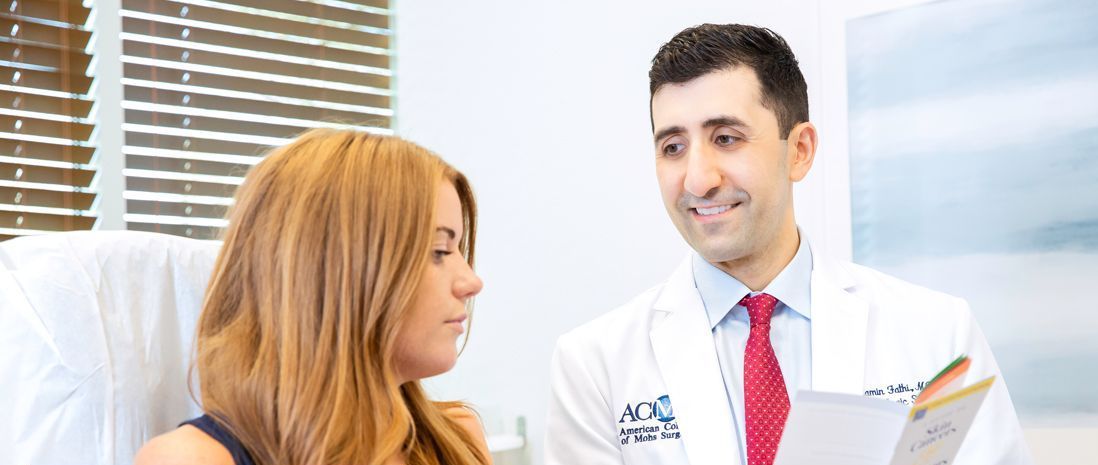Rosacea Treatment in Phoenix, AZ
We manage redness, bumps, and flare-ups effectively.
Rosacea Treatment: Causes, Symptoms & Flare-Up Management
Rosacea is a chronic skin condition that primarily affects the central face and can lead to persistent redness, acne-like bumps, and visible blood vessels. Although not life-threatening, rosacea significantly impacts self-esteem and quality of life for many patients. At Phoenix Surgical Dermatology Group,
our board-certified dermatologists provide comprehensive diagnosis and personalized treatment options to help you regain control over your skin health.
What Is Rosacea?
Rosacea is a long-term inflammatory skin disorder that causes recurring symptoms, most commonly facial redness and irritation. It often begins with a tendency to flush or blush easily, and over time, this redness can become permanent and more severe. In some patients, symptoms also affect the eyes or cause skin thickening on the nose and other areas.
Common Rosacea Symptoms:
- Persistent facial redness
- Flushing and blushing
- Visible broken blood vessels (telangiectasias)
- Acne-like bumps (papules and pustules)
- Burning, stinging, or itchy skin
- Swollen or sensitive skin
- Enlarged pores
- Red, dry, or irritated eyes
Rosacea tends to develop between ages
30 and 60, and symptoms can worsen over time if left untreated.
Who Is Most at Risk for Rosacea?
Rosacea affects around 1 in 10 individuals, with the following groups being at higher risk:
- Women (although men may experience more severe symptoms)
- Fair-skinned individuals of Northern European, Celtic, or Scandinavian ancestry
- Those with a
family history of rosacea or acne
- People with
sensitive skin
- Individuals frequently exposed to
sunlight or extreme temperatures
What Causes Rosacea?
The exact cause of rosacea is unknown, but several contributing factors have been identified:
Hyperactivity of facial blood vessels, leading to redness and flushing
Chronic inflammation
Sun exposure
Genetic predisposition
Overgrowth of the
Demodex mite, a skin organism found in higher numbers on rosacea-affected skin
Dysfunction of the immune system
Types of Rosacea
There are four recognized subtypes of rosacea, each with distinct symptoms:
1. Erythematotelangiectatic Rosacea
- Persistent redness and flushing
- Visible blood vessels (telangiectasias)
- Sensitive, stinging, and scaly skin
2. Papulopustular Rosacea
- Red, swollen skin with acne-like breakouts
- Burning or stinging sensations
- Oily skin and occasional flushing
3. Phymatous Rosacea
- Thickened skin with a bumpy or nodular texture
- Most often affects the nose (rhinophyma)
- Enlarged pores and visible blood vessels
4. Ocular Rosacea
- Red, irritated, watery eyes
- Burning or gritty eye sensation
- Swollen eyelids and sensitivity to light
- Possible vision changes
How is Rosacea Diagnosed?
Rosacea is usually diagnosed based on visible symptoms and medical history. During your consultation, a board-certified dermatologist will:
- Examine your skin and eyes
- Ask about your symptoms and potential triggers
- Rule out similar skin conditions like acne or lupus
- Conduct skin testing in rare cases to check for organisms or inflammation
Rosacea Treatment Options
While
there is no cure for rosacea, there are effective strategies to reduce flare-ups, manage symptoms, and prevent worsening of the condition.
Lifestyle & Prevention
Identify personal triggers such as:
- Spicy foods
- Hot beverages
- Alcohol
- Sun exposure
- Stress
- Extreme temperatures
Daily sun protection:
- Use SPF 30+ broad-spectrum sunscreen
- Wear wide-brimmed hats and sunglasses
- Avoid peak UV hours outdoors
Topical Medications
- Metronidazole
- Azelaic acid
- Ivermectin
- Niacinamide (Vitamin B3) for anti-inflammatory benefits
Oral Medications
- Doxycycline and other tetracycline-class antibiotics
- Isotretinoin for severe or resistant cases (under close supervision)
Laser and Light Therapy
- Pulsed dye laser (PDL) or intense pulsed light (IPL) treatments
- Reduce visible blood vessels
- Improve skin tone and texture
The Emotional Impact of Rosacea
Living with rosacea can be emotionally challenging. Studies show that nearly 70% of people with rosacea report reduced self-confidence and social withdrawal. Because many are unaware of the condition, rosacea is often mistaken for acne or alcohol-related flushing, leading to further embarrassment.
Getting an accurate diagnosis and tailored treatment plan from a specialist can help you feel confident in your skin again.
Frequently Asked Questions About Rosacea
Is rosacea the same as acne?
No. While both may cause bumps and pustules, rosacea includes facial redness, visible blood vessels, and skin sensitivity—features not typically seen in acne.
Can rosacea be cured?
There is no permanent cure, but with proper care and medical treatment, symptoms can be effectively managed and minimized.
Will rosacea worsen without treatment?
Yes, rosacea may worsen over time if left untreated, especially in individuals with recurring flare-ups.
Can skincare products make rosacea worse?
Yes, some ingredients (fragrance, alcohol, menthol) can irritate sensitive skin. Use only gentle, non-comedogenic, rosacea-friendly products.
What’s the best treatment for visible blood vessels?
Laser or IPL therapy is often recommended to target and reduce visible facial blood vessels.
Take Control of Rosacea with Expert Care
Rosacea may be a chronic condition, but it doesn't have to control your life. At Phoenix Surgical Dermatology Group, our board-certified dermatologists offer compassionate, evidence-based care to help you understand and manage your rosacea effectively. If you're struggling with persistent redness, flare-ups, or eye discomfort, we’re here to help.
Schedule your consultation today and take the first step toward healthier, calmer skin.





